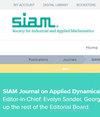A Computational Approach to Polynomial Conservation Laws
IF 1.8
4区 数学
Q2 MATHEMATICS, APPLIED
引用次数: 0
Abstract
SIAM Journal on Applied Dynamical Systems, Volume 23, Issue 1, Page 813-854, March 2024.Abstract.For polynomial ODE models, we introduce and discuss the concepts of exact and approximate conservation laws, which are the first integrals of the full and truncated sets of ODEs. For fast-slow systems, truncated ODEs describe the fast dynamics. We define compatibility classes as subsets of the state space, obtained by equating the conservation laws to constants. A set of conservation laws is complete when the corresponding compatibility classes contain a finite number of steady states. Complete sets of conservation laws can be used for model order reduction and for studying the multistationarity of the model. We provide algorithmic methods for computing linear, monomial, and polynomial conservation laws of polynomial ODE models and for testing their completeness. The resulting conservation laws and their completeness are either independent or dependent on the parameters. In the latter case, we provide parametric case distinctions. In particular, we propose a new method to compute polynomial conservation laws by comprehensive Gröbner systems and syzygies.
多项式守恒定律的计算方法
SIAM 应用动力系统期刊》第 23 卷第 1 期第 813-854 页,2024 年 3 月。 摘要.对于多项式 ODE 模型,我们介绍并讨论了精确守恒律和近似守恒律的概念,它们是完整和截断 ODE 集合的第一次积分。对于快慢系统,截断 ODE 描述快速动力学。我们将兼容性类定义为状态空间的子集,通过将守恒定律等同于常数而获得。当相应的兼容性类包含有限数量的稳定状态时,一组守恒定律就是完整的。完整的守恒律集可用于模型阶次缩减和研究模型的多稳态性。我们提供了计算多项式 ODE 模型的线性、单项式和多项式守恒律以及检验其完备性的算法方法。计算出的守恒定律及其完备性要么独立于参数,要么取决于参数。在后一种情况下,我们对参数情况进行了区分。特别是,我们提出了一种通过综合格氏系统和协同作用计算多项式守恒定律的新方法。
本文章由计算机程序翻译,如有差异,请以英文原文为准。
求助全文
约1分钟内获得全文
求助全文
来源期刊

SIAM Journal on Applied Dynamical Systems
物理-物理:数学物理
CiteScore
3.60
自引率
4.80%
发文量
74
审稿时长
6 months
期刊介绍:
SIAM Journal on Applied Dynamical Systems (SIADS) publishes research articles on the mathematical analysis and modeling of dynamical systems and its application to the physical, engineering, life, and social sciences. SIADS is published in electronic format only.
 求助内容:
求助内容: 应助结果提醒方式:
应助结果提醒方式:


